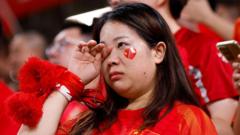In the realm of football, aspirations often collide with stark realities, and for China, a nation with vast resources and fervent ambitions, the hope of becoming a football superpower is crumbling. The Chinese men's national football team, currently ranked 90th in the FIFA rankings, faced a devastating blow when they suffered a staggering 7-0 defeat to Japan during a World Cup qualifier—a result that has been called "rock-bottom" by local media.
This disheartening outcome is not an isolated incident but part of a larger pattern of failure. The Chinese team has suffered a series of humiliating losses, including defeats to lesser-seeded teams such as Oman, Uzbekistan, and Hong Kong. The pressure on players and coaches intensified following this substantial loss, culminating in a wave of arrests related to widespread match-fixing and corruption within the sport, contrasting sharply with the government’s previous ambitions for football transformation.
Since Xi Jinping assumed power in 2012, he has been vocal about his desire to see China succeed in football. His ambitions included qualifying for the World Cup and eventually hosting and winning it. His vision, however, seems increasingly unattainable, as a recent remark by Xi suggested a loss of confidence in an otherwise optimistic outlook.
Experts argue that the political stranglehold on the sport hinders progress, citing mandates that restrict the independence of football decision-making from government interference. China's one-party system prioritizes top-down management, which may drive results in industries like technology and sports infrastructure but fails to develop individual sports like football that thrive on grassroots engagement and organic growth.
Despite these systemic issues, the love for football persists among a considerable segment of the Chinese population. The women's national team remains a beacon of success, ranked 17th globally, while domestic leagues enjoy decent attendance. However, the spirit of the sport at the grassroots level continues to falter. Compared to the thousands of registered players in competitive leagues worldwide, China boasts less than 100,000—a striking comparison that highlights the lack of youth engagement in football.
Corruption scandals have further intensified scrutiny on leverage and operations within Chinese football, exemplified by the admission of the former national team coach, Li Tie, who confessed to match-fixing and bribery practices that have plagued the sport for years. These revelations, coupled with the alarming number of professional clubs that have ceased operations during economic downturns, cast a shadow over football's potential revival.
As China's economy faces challenges, and football's prestigious status declines, fans are left grappling with a sense of despair mixed with humor regarding their team's performances. It is evident that without a sustainable framework supporting grassroots-level growth, China's dreams of becoming a football powerhouse remain just that—dreams. While the nation excels in individual sports through dedicated training and infrastructure, the collective culture and investment necessary for team sports like football remain woefully insufficient.
In light of the recent backlash and dire performances, many commentators believe that a shift in approach—focusing on long-term development free from political pressures—will be pivotal for any future success in football. For now, as fans reflect on the painful reality and the admixture of humor stemming from their disillusionment, the future of Chinese football remains uncertain.

















